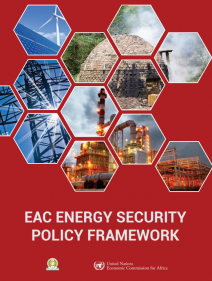The East African Community (EAC) have collectively experienced rapid economic growth and transformation over the last decade, in spite of an adverse global economic environment. The main drivers of these changes have been the rapid growth of domestic aggregate demand, robust commodity markets, for the most part, better economic management practices, public investment and a generalized improvement in the investment climate. However, limited energy production capacity continues to be a constraint on regional growth. Its development would be an enabler of growth and transformation. Continued economic and social progress in the EAC will require growing energy capacity and access to affordable energy in an environment of improved energy security. The energy sector of the EAC features energy security challenges in the biomass, electricity and oil and gas sub-sectors. This energy security policy framework for the East African community is intended to provide policy guidance towards better understanding, measurement, monitoring, evaluation and management of energy security risks and challenges in the energy sector of the region. The framework develops models for energy security monitoring, evaluation and management in the biomass, oil and gas and electricity sub-sectors through an approach for integrated overall energy security management. It employs both well-known energy security metrics, such as in the oil and gas sub-sector, as well as putting forth new dimensions to energy security management in the biomass and electricity sub-sectors. The framework proposes institutional framework both for the monitoring, evaluation and reporting functions for biomass, electricity and oil and gas supply security and the coordination of decisions and directives for overall energy security management and emergency responses. The energy security policy framework is not a binding policy document for the region but it aims to provide the foundational policy framework so that the partner states will take action to devise energy security policy, strategy and action plans, along with their institutionalization. The framework is developed based on consultative processes in the EAC partner states.
Share this:
Release Date:
3 November, 2018
© United Nations Economic Commission for Africa

